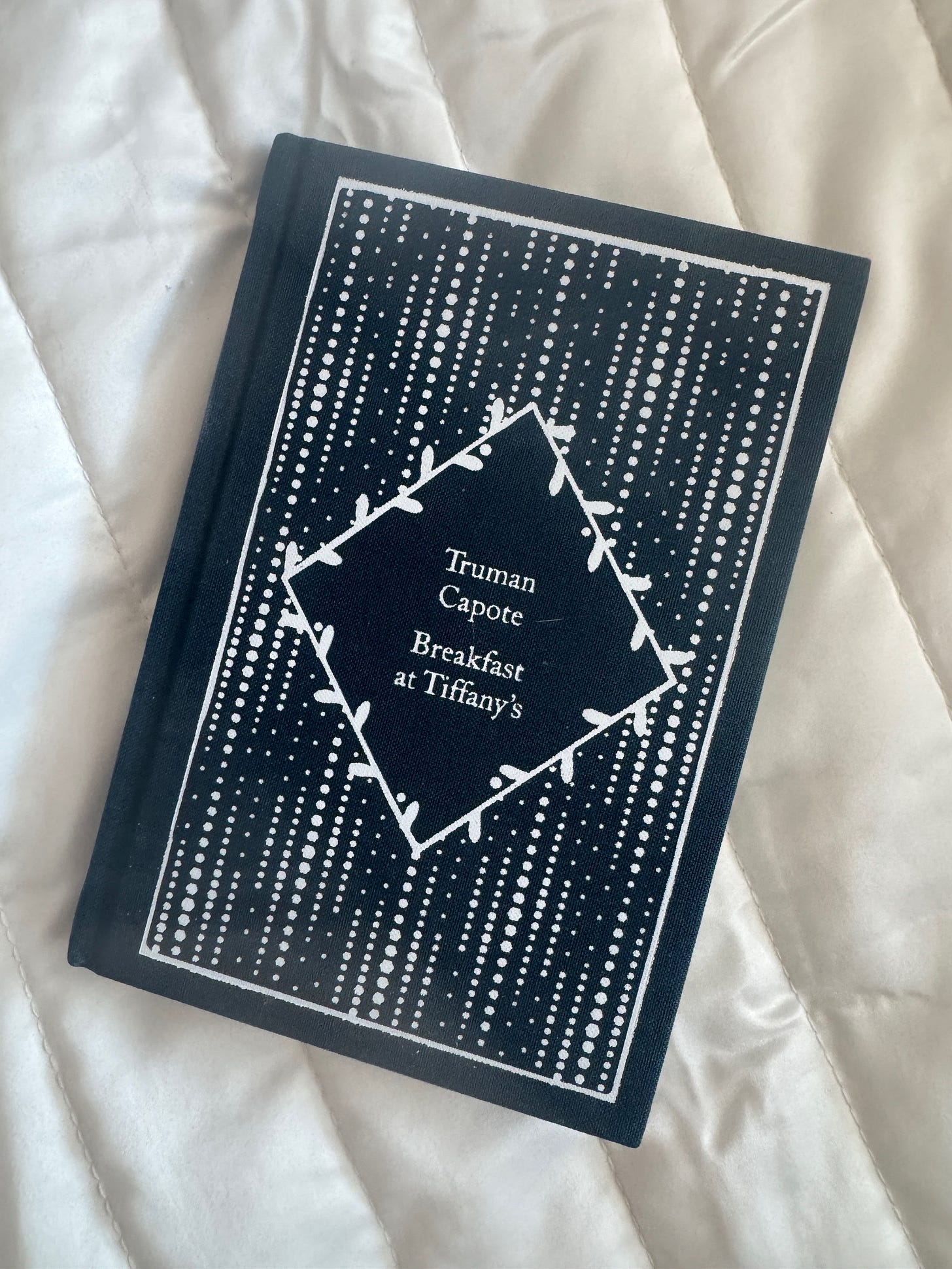on practice
When I asked Melanie if she’d be up for writing a guest post On Practice, and she pitched writing about her reading practice, I didn’t quite realize that I’d been, through her Substack Notes posts about the books she’s been reading, on this journey with her. Melanie’s writing is daringly vulnerable and utterly human. I hope you enjoy.
Melanie Cole is a writer and poet from Tacoma, Washington. She writes about themes of family, natural disaster, the natural world, faith, and the unusual. You can find her work in Grit City Magazine, Dandelion Revolution Press, the Tacoma News Tribune, and on The Mighty. You can find her at Melanie Writes and her Stack.
My mother makes fun of me for being a “wanter.” There’s always some silly little thing that I want. It’s true. I keep a running list in my head of strange little things that I want for no real reason other than I am somewhat of a magpie of a person. I am by no means a hoarder, but I like keepsakes, if only because they are keepsakes. For two years, I have gushed over a Tiffany blue leatherbound copy of Truman Capote’s novella, Breakfast at Tiffany’s. It is my favorite book, and most of the general public is unaware that Capote wrote the story before the iconic film was made. What I like most about the novel is that it is narrated by Paul Varjak, who plays only a foil to Holly Golightly’s character in the film. Varjak’s narration plunges the story into depths that the film cannot reach. It is heavier. Disquieting.
The problem with purchasing the $100 copy of that Tiffany blue leatherbound book is that I can’t read it. I mean, of course, I can read it; I am perfectly literate. I was tested as a first grader and was reading at a college level then. But now, I live with two disabilities, each developed in adulthood, that cause severe cognitive impairments.
One of the first ways these cognitive impairments presented themselves was in my inability to read and process large amounts of information, such as that in a book, an essay, or a work report. It may seem strange that I am a writer who cannot read, but rest assured, I employ an arsenal of AI tools at my disposal to read back to me every word I have typed and every change I have made, whether it be an essay or a fictional story. These tools help me comprehend what I’m staring at, so it all doesn’t look like a babel of words.
I’ll tell you now that I didn’t hold out for that $100 Tiffany blue leatherbound copy of the book. Wouldn’t it be a nice bookend to this essay to say that I finally purchased it? But no, I’m disabled and I don’t work because of it, so there will be none of those kinds of extraneous purchases in my future. However, what I did find was a beautiful clothbound version of the book for just $15. It’s definitely a collector’s item.
I started collecting books because I could not read them. I used to go to the library and check out armfuls of books that I could not read. Just the appearance of being a reader, I thought, might make me one. Last October, I had Frankenstein, Dracula, and From Hell on my proverbial nightstand. From Hell was the only one I was able to follow because it is a graphic novel. I was able to follow some of Dracula. I gave up on Frankenstein after the letters.
I felt as if I was missing out on a big part of my life. In college, living in London, I read on the Tube constantly. Whether it was for class or fun, I always had a book in my hand. When I graduated into my mid-20s, I collected an entire bookshelf of political philosophy and cosmology. I read Stephen Hawking and Carl Sagan, Karl Marx and Hannah Arendt. And slowly, I just couldn’t do it anymore. I was rather randomly diagnosed with epilepsy.
One day, I just dropped down on my bedroom floor and had a five-minute tonic-clonic seizure. In tandem, I developed something called schizoaffective disorder. Both of these conditions greatly impacted my cognition. I had to leave my career, partly because I couldn’t keep up anymore. I couldn’t keep up with any job I had. I couldn’t understand simple directions. More importantly, I couldn’t read and comprehend.
I resigned myself to audiobooks for the rest of my life, to which I often fall asleep and lose my place completely. This summer, however, I had an idea. Could I listen to an audiobook and read along with it?
I started with Truman Capote’s In Cold Blood. It is dense and commands attention, and every small detail matters. There was no falling asleep when my eyes were on the page. I had listened to the audiobook about four times before, but this was my first reading of the physical book, and I have to say that I gleaned so much more from it than all of my listenings combined. It was a daunting book to start with. I could have picked something easier in my library, but I finished it, and I was proud of myself.
Ernest Hemingway’s The Sun Also Rises was next, short but filled with minute details, especially in the bullfighting scenes. Some might think this is a phone-it-in book due to its length, but it is masterfully crafted, and I felt as if I was reading the very personal journals of Jake, the narrator. My reading became quicker this time. I read at times beyond the narration, which made it a bit confusing, but I learned to course correct and move forward.
Next, I chose Harper Lee’s To Kill A Mockingbird because I thought I would find it familiar. The more I read, the more I remembered the storyline. I thought this would ignite my comprehension. It did. My experiment appeared to be working. Although, because I knew the story so well, I felt myself starting to get a little lazy and began listening to the audiobook rather than reading along with it. I had to remind myself that just because I knew the story didn’t mean there wasn’t value in the exercise. I needed to keep going. And I did.
And so, one day, I just cracked open my clothbound cover of Truman Capote’s Breakfast at Tiffany’s. It had never been read. And I read it. In one sitting. No audiobooks, no Speechify, just me and my imagination. I imagined the handsome voice of George Peppard narrating the story and the likeness of Audrey Hepburn (though Capote wanted Marilyn Monroe for the role) bouncing in and out of her apartment, ringing bells at all hours of the night because she has forever lost her key. I read about the trail of heartbroken men who loved her and of the death of her dear brother Fred. And through it all, Paul Varjak gives a disarming account of a young woman who is so mixed up within herself that she doesn’t know which way is up. And I read it. All of it.
Reading Breakfast at Tiffany’s on the page for the first time gave me something new, just as reading all of these other books did. On the page, there is more room for imagination, for character development, for the breath of a story. Finally, I can read in the way I want to again.
invitation to guest post
unraveling, unmoored will soon be hearing from Jason M. O'Toole on his poetry writing processes. We seek guest posts like these and more. Guidelines can be found on the About Page. Please message or email with questions.
previous guest pots
unraveling, unmoored thrives on reader support; without you, we wouldn’t be here. We’d be somewhere else looking for you. We’d love to connect with more like-minded poets, artists, and practicing souls, and you can help us find them by talking us up in all of your digital and analog spaces and sharing this post with everyone you’ve ever met. With gratitude.
If this piece inspired you or otherwise spoke to you, consider upgrading to a yearly subscription or sending a one-time tip to unraveling, unmoored.









This really moved me. Wish I had more to say. I'm humbled and moved.
I had this link up for the past couple of days, waiting for the patience to enjoy it. Worth the wait <3 Of course, kudos to you for finding the path back and walking along until you're once again reading! <3 So cool.